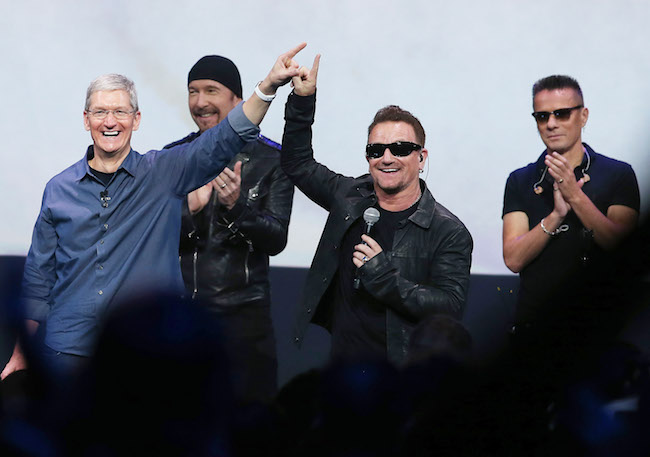
“What Did I Screw Up?” is a mental exercise that occasionally keeps me up at night. It’s when I think back to something I wrote that I wish I could revise or even take back completely. Generally, I’m fine with the rogues’ gallery of takes that I’ve accumulated over the years. I don’t agree with all of it, but that’s okay. Evolving your perspective over time is a sign of personal growth! And I don’t think I’ve been egregiously wrong many times.
I was wrong about Songs Of Innocence, though.
Songs Of Innocence is a U2 album that came out five years ago as of next month. At the time, I dismissed it as “an edgeless album” that “justifies its own existence, but just barely.” Today, after spending the past few week or so listening to it, I would call Songs Of Innocence the best album that U2 has put out in the 21st century. If that seems like faint praise, I’ll go further: I think it’s the best U2 album since 1993’s Zooropa. Every track qualifies, at the very least, as as a “very good U2 song.” And there are two songs (“Every Breaking Wave” and “Song For Someone”) that I’m tempted to nudge toward “U2 classic” status. Overall, the album approaches the band’s prime, which is as much as you can reasonably expect from a 2010s U2 record.
I guess you could say that Songs Of Innocence “grew on me,” to use one of the oldest rock-critic clichés. But, of course, there’s more to it than that. My original review, like pretty much everything written about Songs Of Innocence in the fall of 2014, was preoccupied with how the album was released to Apple users, via a free “giveaway” in which it was systematically (and involuntarily) uploaded on tens of millions of phones. The intention was to manufacture a monoculture moment where “everyone” would be listening to the same U2 album at once. But the result was the biggest music-related PR disaster of the decade.
“I had this beautiful idea and we kind of got carried away with ourselves,” Bono subsequently explained in a sheepish and sort of sad Youtube video. “Drop of megalomania, touch of generosity, dash of self-promotion and deep fear that these songs that we poured our life into over the last few years mightn’t be heard. There’s a lot of noise out there. I guess we got a little noisy ourselves to get through it.”
The backlash was swift and overwhelming. In the press, U2 and Apple were called “inconsiderate,” “kinda creepy,” and “tone-deaf,” and even likened to Big Brother from George Orwell’s 1984. Customers complained that uploading Songs Of Innocence was a grievous invasion of privacy. And they were offended that a band as, well, old and uncool as U2 had encroached on the sanctity of their digital music collections. Many people took to social media to register their displeasure, including the rapper Tyler The Creator, who memorably compared the indignity of finding Songs Of Innocence on his phone to “waking up with a pimple or like a herpes … F*ck Bono. I didn’t ask for you, I’m mad.”
But looking back all these years later, I can’t help but wonder: Why were we so mad about U2 putting a free album on our phones? Wouldn’t it be wonderful to live again in a pre-Trump world, where you had the luxury to get worked up about a so-called Orwellian scheme involving a melancholic late-period U2 record? Isn’t it crazy that people cared so much about this?
First, let’s concede the obvious: Putting Songs Of Innocence on all of those phones, without permission, was a terrible idea. It reeked of arrogance and, worse, naiveté. U2 had originally forged a relationship with Apple in the early ’00s, when the single “Vertigo” was featured in one of the first iPod commercials. “He’s a poetic fellow, an artist and a businessman,” Bono mused of Steve Jobs. He actually put “artist” before businessman! Clearly, U2 was already a bit deluded about Apple as a creative partner well before the Songs Of Innocence debacle.
As a ploy to promote the album, the iPhone stunt did the opposite of what good advertising is supposed to do, which is make your product seem essential. Giving Songs Of Innocence away for free actually made the album seem worthless, an annoyance akin to spam. But U2’s biggest mistake was failing to grasp a fundamental truth of modern consumer culture: People now care way more about their phones than any individual album. (Even an album they might actually want.)
Thirty years ago, the average music fan might have fetishized a vinyl copy of The Joshua Tree. But by the mid-2010s, that loyalty had long since transferred to the piece of hardware that we all carry on us during every waking moment, and reach for approximately 800 times per day. People treat their phones like sacrosanct extensions of themselves, which made the forcible entry of Songs Of Innocence feel especially like a violation.

“The delivery mechanism amounts to nothing more than spam with forced downloads, and nothing less than a completely indefensible expansion by Apple beyond its operational purview,” wrote Wired. “Songs of Innocence is not a well-intentioned gift from a dorky uncle with poor taste, it is another example of how Big Brother can intrude on our lives.”
Let’s say that argument, along with every other criticism made of the Songs Of Innocence campaign, is legitimate. It was a bad idea, they should have gotten our permission, we must never allow Big Tech to overstep its bounds. With the benefit of hindsight, it’s time to concede another point: None of this, ultimately, was that big of a deal.
The most ominous implication from the harshest critics of the Songs Of Innocence giveaway basically boiled down to a variation of the “slippery slope” argument: If Apple would dare do this, what could possibly be next? Would we all be forced to hear the next Coldplay album? Would the latest iteration of the iPhone be brought to you by the bros from Mumford And Sons? Could Apple figure out a way to implant the next Imagine Dragons single in our brains?
Thankfully, none of these soft-rock doomsday scenarios came to pass. After Songs Of Innocence, it was clear that any band attempting something similarly brazen probably would be killed in the press. But technology, along with listener habits, also moved on. Just five years later, the idea of curating a music collection on your phone is kind of quaint for the average listener. In the streaming era, every album appears on your phone, week after week.
You know what else seems a little old fashioned now? The expectation that our listening habits are private. Every time you log on to Spotify or Apple Music, the songs you play are tracked and that data is used to point you toward other songs you might like. As listeners, we freely give this information away, with only faint recognition that this data is also commodified and sold to advertisers and marketers.
In 2014 — the same year people were up in arms over the violation of Songs Of Innocence — Spotify acquired the “music intelligence” firm Echo Nest. “Together they began looking at the 1.5 billion user-generated playlists at Spotify’s disposal,” Liz Pelly wrote for The Baffler earlier this year. “Studying these playlists allowed Spotify to more deeply analyze the contexts in which listening was happening on its platform.” This eventually enabled companies to target consumers whose listening habits appeared to coincide with their core demographics. The bitter irony is that while we once rebelled against Songs Of Innocence as a signifier of Big Brother, we would eventually consent to far more significant invasions on our “private” listening with nary a protest.
In the long run, U2 survived the controversy without any serious damage. In 2017, the band’s Joshua Tree stadium tour grossed $317 million worldwide, selling a very impressive 2.73 million tickets. But the debacle did seem to all but extinguish U2’s pop ambitions. Like The Rolling Stones before them, U2 yearned to compete in the pop mainstream even as the members aged well into their 50s. After Songs Of Innocence, however, they seemed better off touring behind one of their 1980s classics.
Songs Of Innocence deserved better. I don’t want to oversell it. It is just a late-period album by a band of gazillionaires, after all. And it requires some editing — the cloying lead-off track “The Miracle (Of Joey Ramone)” is easily the worst song on the record, and probably the one cut that the U2 haters heard blaring from their phones before angrily trying to delete the album.
But if you start instead with the second number, the wistful “Every Breaking Wave,” Songs Of Innocence is set up as a moving and surprisingly wise meditation on mortality. It might even put a lump in your throat, in that shamelessly emotional “big rock moment” way only U2 can, with “Song For Someone.” It’s a love song from a husband to a wife, or a parent to a child. Bono sings about “a light you can’t always see,” the sort of grand-gesture spiritual talk that populates a dozen U2 ballads. If you listen once it might seem like a chore. You’ll probably roll your eyes. But if you can listen a few more times, when you have a moment to think away from outside noise, it will sink its teeth in your heart. Five years ago, Songs Of Innocence should have had that opportunity.






